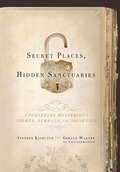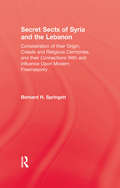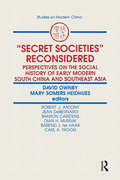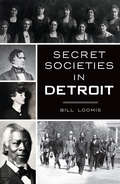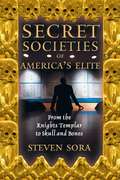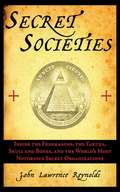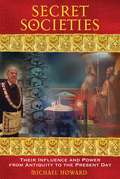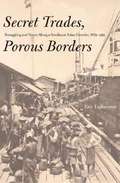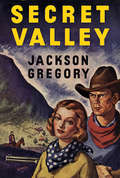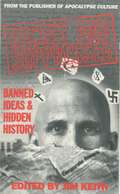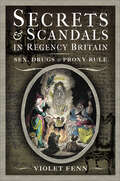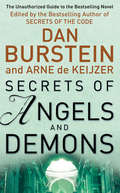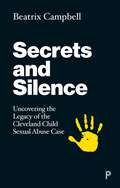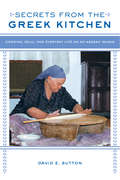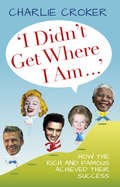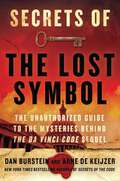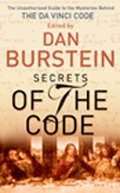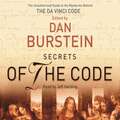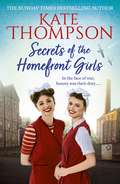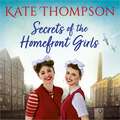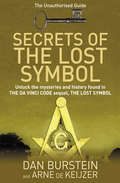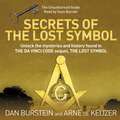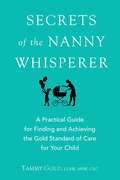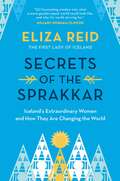- Table View
- List View
Secret Places, Hidden Sanctuaries: Uncovering Mysterious Sights, Symbols, and Societies
by Gerald Warner Stephen Klimczuk“[A] brilliant new tome . . . If you like intrigue, hidden gems and historical treatments about all things ‘off limits’ this book will fascinate you.” —The American SpectatorThe doors of some of the world’s best-hidden places and most secretive organizations have now been thrown wide open! Some of the names are familiar: Area 51, Yale’s Skull and Bones, Opus Dei, the Esalen Institute. Others are more obscure, hidden by fate or purposeful deception, such as the Mount Weather Emergency Operations Center, the super-secure facility where Vice President Dick Cheney was secreted after the 9/11 attacks, and Germany’s Wewelsburg Castle, which was intended to become the mythological centerpiece of the Nazi Regime. Readers can take an unprecedented look deep inside the off-the-map military installations and shadowy organizations that operate in the murkiest corners of our world.“A great book . . . written with wit and style . . . Of course there are many other famous sites discussed as well, from the brooding castle which Himmler designed as the headquarters of the SS, to the shrine of the Oracle at Delphi, to Bollengin Tower on Lake Zurich, Switzerland, which Carl Jung built as a retreat for his study into psychology.” —The Scottish Rite of Freemasonry
Secret Sects Of Syria: A Consideration Of Their Origin, Creeds And Religious Ceremonies, And Their Connection With And Influence Upon Modern Freemasonry (classic Reprint)
by SpringettFirst published in 2007. Routledge is an imprint of Taylor & Francis, an informa company.
Secret Societies Reconsidered: Perspectives on the Social History of Early Modern South China and Southeast Asia
by David Ownby Mary F. Somers HeidhuesA discussion of the development of secret societies within China and among Chinese communities in colonial Southeast Asia in the late 18th and 19th centuries.
Secret Societies in Detroit
by Bill LoomisSecret societies have operated in Detroit for most of the city's history. Many started for fun and companionship. Others had more serious ends in mind. The African American Mysteries: The Order of the Men of Oppression helped enslaved people escape the South for freedom in Canada. During the Civil War, so-called black lantern societies like the Knights of the Golden Circle and the Union League waged a covert war in Detroit and across the northern Midwest. In the last century, it wasn't uncommon for a sober suburbanite to catch the train to Detroit and don yellow silk pantaloons, a purple fez and embroidered vest to drink "Tarantula juice." Join Bill Loomis in this fascinating look into the secret world of these groups.
Secret Societies of America's Elite: From the Knights Templar to Skull and Bones
by Steven SoraAn expose of the dark and critical role secret societies play within the ruling families in America and their influence on American democracy, current events, and world history. • Reveals the enormous influence secret societies still have on contemporary American life. • Shows how the secret Masonic cells that smuggled in the democratic ideals inspiring the American Revolution also enabled the future elite of the new society to build huge fortunes. Elite and secret societies have always been a major force in the history of Western civilization. The alliances formed in secret societies such as the Knights Templar, the Knights of Christ, and the Freemasons transcended patriotism and religious beliefs and had a powerful influence on the establishment of the United States of America. While these secret associations of merchants, smugglers, occultists, gamblers, spies, and slavers succeeded in freeing the United States from foreign domination, the dark side is that the elite used their secret connections to further their own wealth and power. These secret cells did not hesitate to sponsor the assassination of a president and even attempted to break up the union on several occasions when it was deemed expedient. From the Sons of Liberty and the Essex Junto to the Ku Klux Klan, secret societies have played critical roles in building the fortunes of America's elite. Now Steven Sora reveals in alarming detail how secretive societies continue to wield power even today as organizations such as Yale's Skull & Bones unite America's modern ruling families as strongly as Masonic Lodges once connected the Astors, Livingstons, and Roosevelts. Their immense power and wealth allow this elite to control America to an even greater degree than the Templars once dominated Europe.
Secret Societies: Inside the Freemasons, the Yakuza, Skull and Bones, and the World's Most Notorious Secret Organizations
by John Lawrence ReynoldsThey generate fear, suspicion, and--above all--fascination. Secret societies thrive among us, yet they remain shrouded in mystery. Their secrecy suggests, to many, sacrilege or crime, and their loyalties are often accused of undermining governments and tipping the scales of justice. The Freemasons, for example, hold more seats of power in the U.S. government than any other organization. No fewer than sixteen presidents have declared their Masonic affiliation, and there may have been more. Secret societies have infiltrated pop culture as well. Celebrity members of Kabbalah include Madonna, Demi Moore, and Elizabeth Taylor, among others.From the Mafia and the Yakuza to the Priory of Sion, Skull and Bones and the Templars, Reynolds offers an illuminating and entertaining exploration of the stories--confirmed and fabricated--that surround these societies, as well as provides detailed information on their origins, initiations, rituals, and secret signs. Dispelling myths and providing gripping revelations--such as a direct historical link between the Assassins of the Middle Ages and today's Al Qaeda--Secret Societies gives us a smart, surprising look at the best known and often least understood covert organizations.
Secret Societies: Their Influence and Power from Antiquity to the Present Day
by Michael HowardAn overview of how esoteric brotherhoods have shaped history • Examines the secret chronology and clandestine causes of seminal world events • Shows how secret societies feed into one another, and how they have worked together For thousands of years secret societies--guardians of ancient esoteric wisdom--have exercised a strong and often crucial influence on the destiny of nations. Though largely ignored by orthodox historians, the Freemasons, Knights Templar, and Rosicrucians affected the course of the French and American Revolutions as well as the overthrow of the medieval feudal order. Inevitably, the true ideals and esoteric practices of these societies have, at times, been perverted by self-serving individuals. The Nazis and the Bolsheviks, British security forces, the founding fathers of America, and the Vatican have all justified their actions--for good or for ill--by claiming the mystic ideals of secret societies.Michael Howard explores these connections, tracing their effects in politics and statecraft from the time of ancient Egypt up to the present. He sheds light on the influence of secret societies on governments and in the lives of many well-known figures, including Frederick the Great, John Dee, Francis Bacon, Benjamin Franklin, Comte de Cagliostro, Helena Blavatsky, Rasputin, and Woodrow Wilson. He contends that the recent formation of the European Union was directed by an umbrella group of secret societies and reveals that though secret societies have been persecuted throughout history, they have survived and continue to operate powerfully in world affairs today.
Secret Trades, Porous Borders: Smuggling and States along a Southeast Asian Frontier, 1865-1915
by Eric TagliacozzoOver the course of the half century from 1865 to 1915, the British and Dutch delineated colonial spheres, in the process creating new frontiers. This book analyzes the development of these frontiers in Insular Southeast Asia as well as the accompanying smuggling activities of the opium traders, currency runners, and human traffickers who pierced such newly drawn borders with growing success. The book presents a history of the evolution of this 3000-km frontier, and then inquires into the smuggling of contraband: who smuggled and why, what routes were favored, and how effectively the British and Dutch were able to enforce their economic, moral, and political will. Examining the history of states and smugglers playing off one another within a hidden but powerful economy of forbidden cargoes, the book also offers new insights into the modern political economies of Southeast Asia.
Secret Valley
by Jackson GregorySecret Valley, first published in 1939, is a classic old west novel of action, adventure and romance by Jackson Gregory (1882-1943), author of more than 40 western and detective novels. From the dust-jacket: Ross Haveril was the last of a clan of hard-fighting, quick-tempered men. Now, after years of prospecting in South America, he was returning to his home in Secret Valley. But Haveril didn’t reckon on the changes that time brings. This was the West of lawless days, and things happened suddenly and without warning. That’s why he didn’t have much time to think when he faced his bitterest enemy, Tom Storm, in command of the valley. First he had to save his home and avenge Bob Roberts, who had died helping him. Then there was a gambler’s beautiful daughter who was certainly worth fighting for, if anything is. Only Jackson Gregory could spin a yarn as lyric and breathless as Secret Valley. It’s a lively tale of romance, of whirling action and flying bullets, written with an intimate knowledge of the West and its people.
Secret and Suppressed
by Jim KeithAn underground sensation, Secret and Suppressed confronts the reader with disquieting revelations on mind control, secret societies, media disinformation, cults and elite cabals.
Secrets & Scandals in Regency Britain: Sex, Drugs & Proxy Rule
by Violet FennThis book takes an entertaining peek at the secrets and scandals of Regency Britain, a period in which the heir to the throne was making merry with his mistress whilst his ailing father attempted to keep a grip on both his crown and his finances. From Princess Caraboo to the Peterloo Massacre, the Regency was a period of immense upheaval in both personal and public lives as well as in politics. We’ll see how the advent of the modern media brought ‘spin’ to scandal and focus on stories of those people and events who encapsulated the age.
Secrets Of Angels And Demons
by Dan Burstein Arne de KeijzerThe first book to help you understand the mysteries and secret histories within the plot of Dan Brown's bestselling ANGELS AND DEMONS.SECRETS OF ANGELS AND DEMONS provides the curious reader with concise, authoritative explorations of the major themes that help propel the plot of Dan Brown's new bestseller, ANGELS AND DEMONS. Taking the same detailed approach as SECRETS OF THE CODE, Burstein and de Keijzer examine the provocative issues raised in the novel: the existence and scope of the Illuminati and their relationship to other 'secret societies'; the ongoing, centuries-old debate between science and religion; the history and practices of the Vatican and pagan symbolism and its place within the Church. They also explore the world of Bernini, master artist of the Baroque era, and the secret meanings behind his symbolism; what really happened in the trial of Galileo; and the real state-of-the-art of anti-matter technology. This book will delight and engage everyone who finished ANGELS AND DEMONS thinking, 'I need to know more about this book'.
Secrets and Silence: Uncovering the Legacy of the Cleveland Child Sexual Abuse Case
by Beatrix CampbellThe child sexual abuse scandal in the English county of Cleveland in the 1980s was a defining moment but not the scandal we were led to believe it was. Acclaimed journalist Beatrix Campbell has uncovered government documents that show how medical evidence of childhood rape identified by pioneering paediatricians was deemed credible but ‘dangerous’ – it was more important to save money than save children. This book reveals how this secret has framed policy making and public opinion and the consequences it has had for children, professionals, justice and the state. The deaths of ‘national treasures’ Sir Jimmy Savile and Sir Cyril Smith led to a torrent of evidence of childhood suffering, the discovery of widespread sexual exploitation and institutional abuse across the world – all in plain sight. The Cleveland children have remained in the shadows. Now, for the first time, a Cleveland child delves into her records and shares her story.
Secrets from the Greek Kitchen
by David E. SuttonSecrets from the Greek Kitchen explores how cooking skills, practices, and knowledge on the island of Kalymnos are reinforced or transformed by contemporary events. Based on more than twenty years of research and the author's videos of everyday cooking techniques, this rich ethnography treats the kitchen as an environment in which people pursue tasks, display expertise, and confront culturally defined risks. Kalymnian islanders, both women and men, use food as a way of evoking personal and collective memory, creating an elaborate discourse on ingredients, tastes, and recipes. Author David E. Sutton focuses on micropractices in the kitchen, such as the cutting of onions, the use of a can opener, and the rolling of phyllo dough, along with cultural changes, such as the rise of televised cooking shows, to reveal new perspectives on the anthropology of everyday living.
Secrets of Success: The Quirks and Superstitions of the Rich and Famous
by Charlie CrokerDid you know that Beethoven made every cup of coffee with exactly 60 beans?Or that Shirley Temple always had precisely 56 curls in her hair?Or that the young Frank Sinatra practised underwater swimming as a way of developing his ability to hold long breaths?In Secrets of Success, Charlie Croker brings his proven blend of gripping trivia and incisive humour to the question of how famous high achievers reached those heights. We’ll see Chopin sleeping with wedges between his fingers to increase their span, learn how P.G. Wodehouse reminded himself which pages of a manuscript still needed work, and find out why Thomas Edison chose his research assistants on the basis of their soup-eating habits.This revealing and entertaining book provides countless glimpses into the methods – and sometimes madness – of the world’s most famous figures. From ancient Egypt to the modern day, you’re about to learn the secrets of their success . . .
Secrets of The Lost Symbol: The Unauthorized Guide to the Mysteries Behind The Da Vinci Code Sequel
by Daniel Burstein Arne de Keijzer“If anyone can divine the contents of The Lost Symbol, it’s Dan Burstein.” —New York magazineWith Secrets of the Lost Symbol, co-authors Dan Burstein and Arne de Keijzer delve into the real history, science, and hidden meanings behind Dan Brown’s latest blockbuster novel, The Lost Symbol. As they have done previously with their extraordinary New York Times bestsellers Secrets of the Code and Secrets of Angels & Demons, Burstein and de Keijzer explore the themes, conspiracies, mythologies, codes, encrypted signs, and alternate histories—from the birth of Knights Templar to the present day—popularized by the acclaimed creator of The Da Vinci Code, giving them fresh and fascinating relevance while separating truth from fantasy.
Secrets of Tut's Tomb and the Pyramids
by Stephanie Ann ReiffDiscusses the building of the Egyptian pyramids, strange stories associated with them, and possible powers possessed by pyramids.
Secrets of the Code
by Dan BursteinUnauthorised (but authoritative) guide to the mysteries behind the phenomenal bestseller THE DA VINCI CODEReaders of Dan Brown's extraordinary bestseller THE DA VINCI CODE are fascinated by the questions raised in the novel. Was Jesus actually married to Mary Magdalene? Was she one of his disciples and did she write her own gospel? Did they have a child together? Did some geniuses of art and science, people like Leonardo da Vinci and Isaac Newton, belong to secret societies that had the most compelling insider information in history, and did Leonardo convey some of these ideas in The Last Supper and other paintings? SECRETS OF THE CODE is the definitive guide to the novel and provides the curious reader with authoritative explorations into the major themes within THE DA VINCI CODE.
Secrets of the Code
by Dan BursteinReaders of Dan Brown's extraordinary bestseller THE DA VINCI CODE are fascinated by the questions raised in the novel. Was Jesus actually married to Mary Magdalene? Was she one of his disciples and did she write her own gospel? Did they have a child together? Did some geniuses of art and science, people like Leonardo da Vinci and Isaac Newton, belong to secret societies that had the most compelling insider information in history, and did Leonardo convey some of these ideas in The Last Supper and other paintings? SECRETS OF THE CODE is the definitive guide to the novel and provides the curious reader with authoritative explorations into the major themes within THE DA VINCI CODE.Read by Sian Thomas and Jeff Harding(p) 2005 Orion Publishing Group
Secrets of the Homefront Girls
by Kate ThompsonA new series from bestselling author Kate Thompson.'Kate Thompson's wartime novels always strike a chord and Secrets of the Homefront Girls is no exception. You can almost smell the Yardley violets drifting over the factory as the girls live lives complicated by the trials and tribulations of war' My Weekly'Kate Thompson's put the lives of women working in the Yardley factory during the Blitz at the heart of her latest novel' Woman's HourStratford, 1939.Britain may be at war, but on the home front keeping up morale and keeping up appearances go hand in hand. For the young women working on the lipstick production line at Yardley's cosmetics factory, it's business as usual.Headstrong Renee Gunn is the queen of the lipstick belt - although her cheeky attitude means she's often in trouble. When Esther, an Austrian refugee, arrives at Yardley's, it's Renee who takes her under her wing and teaches her to be a true cockney.But outside of the factory, things are more complicated. Lily, Renee's older sister, has suddenly returned home after six years away, and is hiding a dark secret. Meanwhile Esther is finding life in England more difficult than expected, and it's not long before Renee finds herself in trouble, with nowhere to turn.In the face of the Blitz, the Yardley girls are bound together by friendship and loyalty - but could the secrets they are hiding be the biggest danger of all?'A compelling saga set around the tenacious women of the East End' Daisy Styles'Kate Thompson is a skillful and humane storyteller who lights up the sooty face of the old East End with tales full of drama and human interest.' Annie Murray
Secrets of the Homefront Girls
by Kate ThompsonA new series from bestselling author Kate Thompson.'Kate Thompson's wartime novels always strike a chord and Secrets of the Homefront Girls is no exception. You can almost smell the Yardley violets drifting over the factory as the girls live lives complicated by the trials and tribulations of war' My Weekly'Kate Thompson's put the lives of women working in the Yardley factory during the Blitz at the heart of her latest novel' Woman's HourStratford, 1939.Britain may be at war, but on the home front keeping up morale and keeping up appearances go hand in hand. For the young women working on the lipstick production line at Yardley's cosmetics factory, it's business as usual.Headstrong Renee Gunn is the queen of the lipstick belt - although her cheeky attitude means she's often in trouble. When Esther, an Austrian refugee, arrives at Yardley's, it's Renee who takes her under her wing and teaches her to be a true cockney.But outside of the factory, things are more complicated. Lily, Renee's older sister, has suddenly returned home after six years away, and is hiding a dark secret. Meanwhile Esther is finding life in England more difficult than expected, and it's not long before Renee finds herself in trouble, with nowhere to turn.In the face of the Blitz, the Yardley girls are bound together by friendship and loyalty - but could the secrets they are hiding be the biggest danger of all?'A compelling saga set around the tenacious women of the East End' Daisy Styles'Kate Thompson is a skillful and humane storyteller who lights up the sooty face of the old East End with tales full of drama and human interest.' Annie Murray(P)2019 Hodder & Stoughton Limited
Secrets of the Lost Symbol: The Unauthorised Guide to the Mysteries Behind The Da Vinci Code Sequel
by Sean Barrett Dan Burstein Arne de KeijzerThe first (unauthorised) literary companion to the mysteries behind Dan Brown's latest blockbuster, THE LOST SYMBOL. From the bestselling Secrets team.Delve into a whole new world of secret societies, ancient mysteries, hidden symbols, new-age philosophy and cutting-edge science ... Discover: the role the Freemasons played in US history; the 'real' Katherine Solomon; the true background of the 'Ancient Mysteries'; the reality of Noetic science and much more ...Presenting ideas from world renowned historians, code-breakers, symbologists, theologians, philosophers and scientists, Burstein and de Keijzer break through the web of conspiracies, mythologies, encrypted signs and alternate histories. SECRETS OF THE LOST SYMBOL is a must-read for anyone who wants to separate reality, speculation, fact and fiction in Dan Brown's global phenomenon.
Secrets of the Lost Symbol: The Unauthorised Guide to the Mysteries Behind The Da Vinci Code Sequel
by Sean Barrett Dan Burstein Arne de KeijzerDelve into a whole new world of secret societies, ancient mysteries, hidden symbols, new-age philosophy and cutting-edge science... Discover: the role the Freemasons played in US history; the 'real' Katherine Solomon; the true background of the 'Ancient Mysteries'; the reality of Noetic science and much more...Presenting ideas from world renowned historians, code-breakers, symbologists, theologians, philosophers and scientists, Burstein and de Keijzer break through the web of conspiracies, mythologies, encrypted signs and alternate histories.SECRETS OF THE LOST SYMBOL is a must-read for anyone who wants to separate reality, speculation, fact and fiction in Dan Brown's global phenomenon.Read by Sean Barrett(p) 2010 Orion Publishing Group
Secrets of the Nanny Whisperer
by Tammy GoldThe New Childcare Bible—A Must-Have Whether You Have Occasional Sitters or a Full-Time Nanny Finding the right caregiver can be one of the most life-changing decisions a parent makes. Whether it's a kindly neighbor for the weekday latchkey hours, a teenage babysitter one night a week, or a full-time professional nanny, the right caregiver can enrich a child's world and literally grow her brain. Hire the wrong one, and this person could cause developmental delays and stress for the entire family. In her groundbreaking new book, Secrets of the Nanny Whisperer: A Practical Guide for Finding and Achieving the Gold Standard of Care for Your Child, nationally recognized parenting expert Tammy Gold draws from her extensive background in child developmental psychology, social work, and family therapy to offer the first childcare bible for parents. Knowing the impact caregivers have on children coupled with the unregulated often unknown world of in-home childcare workers, Gold has devoted her professional career, and now this book, to helping parents navigate through this important--and woefully overlooked--process. She arms parents with invaluable tools, tips, and insider secrets to finding the perfect caregiver-family match. Gold's Family Needs Assessment helps parents identify the traits and conditions that are "must-haves," added "pluses," or nonnegotiable "deal breakers. " Parents can then use this list of qualities to quickly weed out unqualified candidates. She also details what to ask over the phone and in a face-to-face interview, how to structure a trial run (which she deems essential), and what to spell out in a Nanny-Family Work Agreement--another essential tool included in the book. Readers learn her "Nanny Speak 1-2-3" technique to help clarify and resolve issues with the caregiver in a productive, positive way. In addition to saving hours and energy, Parents will also discover as much about parenting as they will about finding a nanny. Secrets of the Nanny Whisperer is chock-full of parenting gems about children's developmental stages, ways to nurture and stimulate the child, and essential strategies for maintaining harmonious and high-functioning parent-child-caregiver relationships. This book is a must read for parents who want to create a happier, healthier and safer childcare experience for their child.
Secrets of the Sprakkar: Iceland's Extraordinary Women and How They Are Changing the World
by Eliza ReidThe Canadian first lady of Iceland pens a book about why this tiny nation is leading the charge in gender equality, in the vein of The Moment of Lift.Iceland is the best place on earth to be a woman—but why? For the past twelve years, the World Economic Forum&’s Global Gender Gap Report has ranked Iceland number one on its list of countries closing the gap in equality between men and women. What is it about Iceland that enables its society to make such meaningful progress in this ongoing battle, from electing the world&’s first female president to passing legislation specifically designed to help even the playing field at work and at home? The answer is found in the country&’s sprakkar, an ancient Icelandic word meaning extraordinary or outstanding women. Eliza Reid—Canadian born and raised, and now first lady of Iceland—examines her adopted homeland&’s attitude toward women: the deep-seated cultural sense of fairness, the influence of current and historical role models, and, crucially, the areas where Iceland still has room for improvement. Throughout, she interviews dozens of sprakkar to tell their inspirational stories, and expertly weaves in her own experiences as an immigrant from small-town Canada. The result is an illuminating discussion of what it means to move through the world as a woman and how the rules of society play more of a role in who we view as equal than we may understand. What makes many women&’s experiences there so positive? And what can we learn about fairness to benefit our society? Like influential and progressive first ladies Eleanor Roosevelt, Hillary Rodham Clinton, and Michelle Obama, Reid uses her platform to bring the best of her nation to the world. Secrets of the Sprakkar is a powerful and atmospheric portrait of a tiny country that could lead the way forward for us all.
